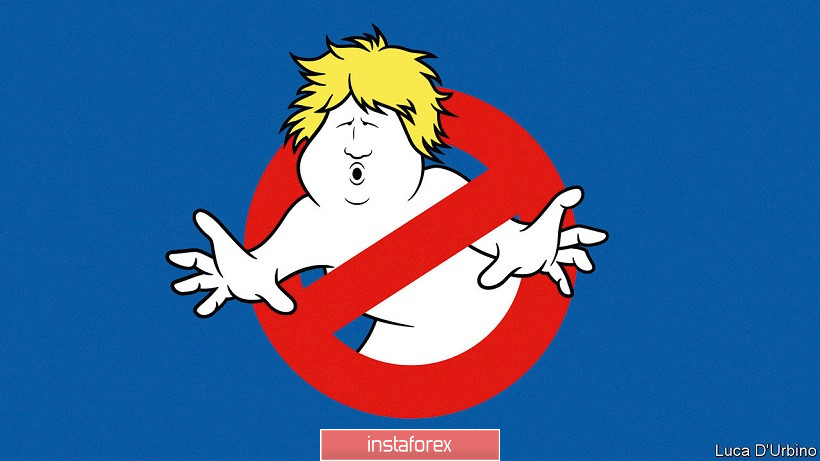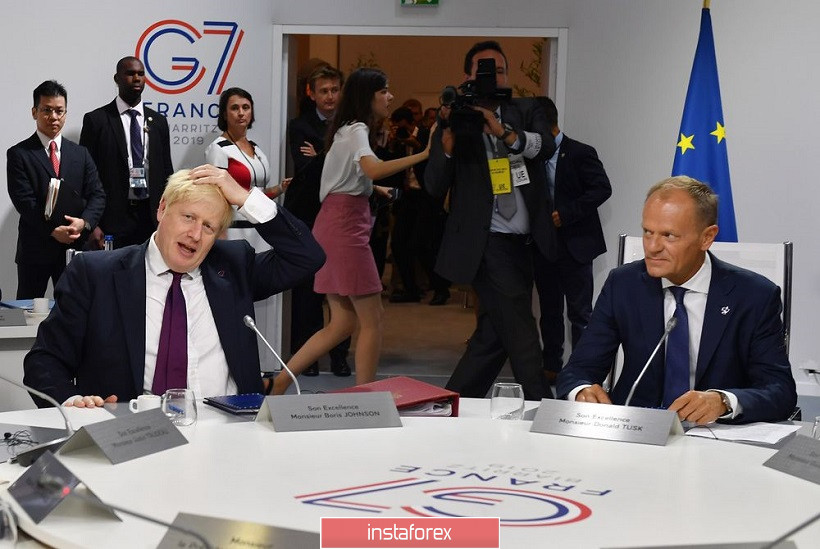The pound reacted rather restrainedly to the news that the Queen of England supported the request of Boris Johnson to temporarily suspend the work of the House of Commons. The reaction of ordinary British and many deputies is too violent - and this fact allows traders to hope that the prime minister's political maneuvers will force politicians to rally. Theoretically, parliamentarians can manage to realize their intentions. To do this, they have a few days, during which they must make crucial decisions for the country. However, Johnson also has his Trump cards, which he can very skillfully use. Thus, the "great confrontation" between the head of government and the House of Commons will begin in just a few days, and the outcome of this battle is quite difficult to predict.

The so-called "queen's move" is necessary for Boris Johnson only for one thing: to deprive parliamentary deputies of temporary space for making appropriate decisions. The parliamentarians will hold their first session this season on September 3, but already on September 9, they will be forced to leave for the "extra holidays" approved by the queen. Forced leave will last until October 14 - the throne speech of Elizabeth II is scheduled for this date. On the one hand, for the remaining working days, deputies will be able to declare a vote of no confidence in the prime minister and form a new government - "national unity". But for this, they need the support of the Conservative Party, which so far has been hesitating on this issue. If the House of Commons votes no confidence of the government, but no new government is formed, the prime minister will dissolve the parliament and announce early elections.
However, the thing is that the prime minister sets the date for new elections, and judging by the statements of his team's representatives, he will appoint them for November, that is, after Britain's "automatic" exit from the EU. It is worth noting here that the law provides for a minimum of 25 days only for campaigning. At the same time, Johnson may refuse to leave his post until October 31, even if a vote of no confidence is passed to him. Formally, he has the opportunity to take such a step, although at the same time, he will ignore the constitutional customs of Britain. But given his last steps, the option of a political demarche cannot be ruled out, especially since there have already been similar precedents in British history (although almost 200 years ago, but still).
In other words, if the opposition political forces represented in the House of Commons do not unite and attract conservatives, Johnson may well outplay the parliament, thereby realizing the "tough" Brexit. According to the head of the Labor Party, Jeremy Corbyn, his party is ready to initiate the issue of passing a vote of no confidence to the prime minister "at the most optimal time for this." Subject to the royal decree, the deputies do not have much time left either next week or in the second half of October, on the eve of the "X-hour". It is worth recalling that during the signal vote that took place this spring, many conservatives did not support the "hard" Brexit option. In fact, Johnson can count on firm support only 100-150 of them out of 650 deputies.
But today the question will be a little different: announcing a vote of no confidence in the prime minister, the Tories, on the one hand, will take a step towards preventing a "hard" Brexit, but on the other hand, they will actually vote for the dissolution of the parliament. During Johnson's premiership, the Conservative Party rating grew by 10 points, that is, up to 33% - the Tories returned to first place in the polls. But the opposition's votes are almost evenly divided between Labor (21%) and Liberal Democrats (19%). This alignment suggests that the conservatives are, in principle, ready to go to early elections, hoping to get an independent majority in parliament, in the wake of the support of Brexit supporters. At the same time, such prospects reduce the likelihood that the Tories will support the idea of creating a government of "national unity", and even more so, led by the eternal opponent of the conservatives - Jeremy Corbyn. The intrigue in this matter remains, and will be resolved (most likely) in early September.

Among experts, another assumption is being discussed. It consists in the fact that all of Johnson's recent actions are a massive and well-planned bluff. The main purpose of which is to convince Brussels that Britain really intends to leave the European Union without a deal. The proponents of this assumption say that Johnson leads the country "in full sails" to the hard Brexit only so that the European Union "flinches at the last moment", that is, literally on the last day before the "X-hour". Allegedly, in this case, Brussels may succumb to blackmail and show political flexibility, at least in the matter of back-stop. Of course, given Johnson's eccentricity, such an option cannot be ruled out - but at the moment, such a scenario seems unlikely.
Thus, the autumn political season will start next week in Britain, which will be one of the "hottest" since the historic referendum in 2016. A contradictory fundamental background reduces the predictability of the GBP/USD pair - the fate of the pound will actually be in the hands of parliamentarians. If they can make Johnson to resign and form a government of national unity despite their political ambitions, the British currency, paired with the dollar, will increase by several figures. Otherwise, the GBP/USD pair will update the annual minimum by testing the 19th figure.
 English
English 
 Русский
Русский Bahasa Indonesia
Bahasa Indonesia Bahasa Malay
Bahasa Malay ไทย
ไทย Español
Español Deutsch
Deutsch Български
Български Français
Français Tiếng Việt
Tiếng Việt 中文
中文 বাংলা
বাংলা हिन्दी
हिन्दी Čeština
Čeština Українська
Українська Română
Română

